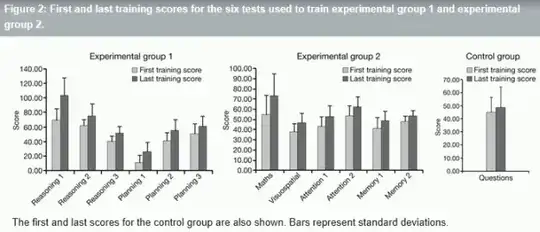No Gain From Brain Training
The largest trial to date of
'brain-training' computer games
suggests that people who use the
software to boost their mental skills
are likely to be disappointed.
A total of 11,430 volunteers aged from
18 to 60 completed the study, and
although they improved on the tasks,
the researchers believe that none of
the groups boosted their performance
on tests measuring general cognitive
abilities such as memory, reasoning
and learning.

Although improvements were observed in every one of the cognitive tasks that were trained, no evidence was found for transfer effects to untrained tasks, even when those tasks were cognitively closely related.
The study has been criticized, though: [1], [2], [3]
Scientific American - Do Brain Trainer Games and Software Work?
Neuroscientist Peter Snyder of Brown University reviewed nearly 20 software studies and concluded that, as a group, they were underwhelming.
They are marred by flaws that induce confounding factors, such as a lack of control groups and follow-up, Snyder warns.
More than a third of those he reviewed were too shoddy even to include in the analysis he printed early this year in the journal Alzheimer’s & Dementia.
One paper, however, exceeded expectations: in a new study Snyder called the “most well-designed” of those he evaluated, the Mayo Clinic tested the Brain Fitness Program by Posit Science.
Encouragingly, the researchers found that the software boosted the brain in ways unrelated to the training. Rather than simply learning to parrot back what they had practiced, participants improved their test scores across a range of brain functions, says clinical neuropsychologist Glenn Smith, who led the study.
Still, the boost was minimal. Subjects who played improved their memory by twice as much as did those in the control group (who spent an equal amount of time watching educational documentaries). After eight weeks of training, that improvement was only about 4 percent.
There have been studies that suggest that mentally stimulating activities in old age helps reduce the risk of Alzheimer's disease/dementia.
"The more you do mentally stimulating
activities -- such as crossword
puzzles or playing chess -- the better
it is," said Dr. Joe Verghese, an
assistant professor of neurology at
Albert Einstein College of Medicine in
New York City.
Verghese recently co-authored a study
that found that seniors who engage in
a wide variety of mental pursuits
while at leisure -- such as playing a
musical instrument, reading and
playing cards or board-games -- seem
to dramatically lower their risk for
developing dementia.
But he stressed that it's never too
early to incorporate mental exercise
into the daily planner. In fact, it's
a habit that should be encouraged
starting in childhood, experts say.
But Crossword puzzles and other mentally stimulating pursuits may just hide, rather than prevent, the progress of Alzheimer.
Researchers in the US said the reality
could be that, even without symptoms,
the brain was suffering progressive
damage behind the scenes.
Mentally stimulating activities might
help the brain "rewire" itself to
circumvent the effects of dementia.
However, once the disease was
diagnosed, damage to the brain was
likely to be greater than it would be
in someone who was not mentally
stimulated.
Dr Robert Wilson, from Rush University Medical Centre in Chicago, said the research team's results suggested that the benefit of delaying the initial signs of cognitive decline might come at the cost of more rapid dementia progression later.
The 12-year-study involved evaluating the mental activity of 1157 people aged 65 and over - none of whom had dementia at the start of the study.
More:
